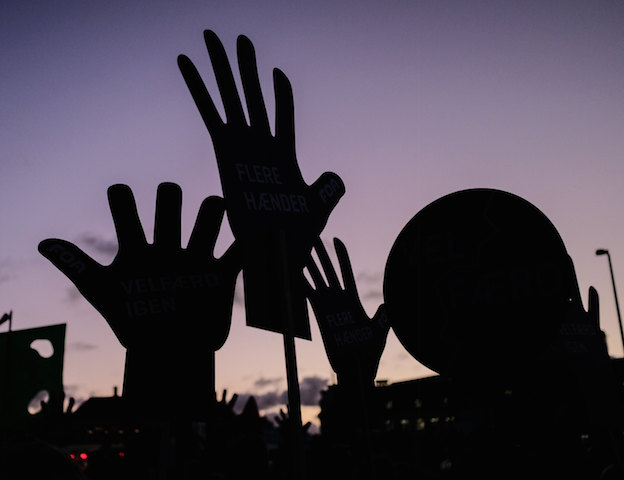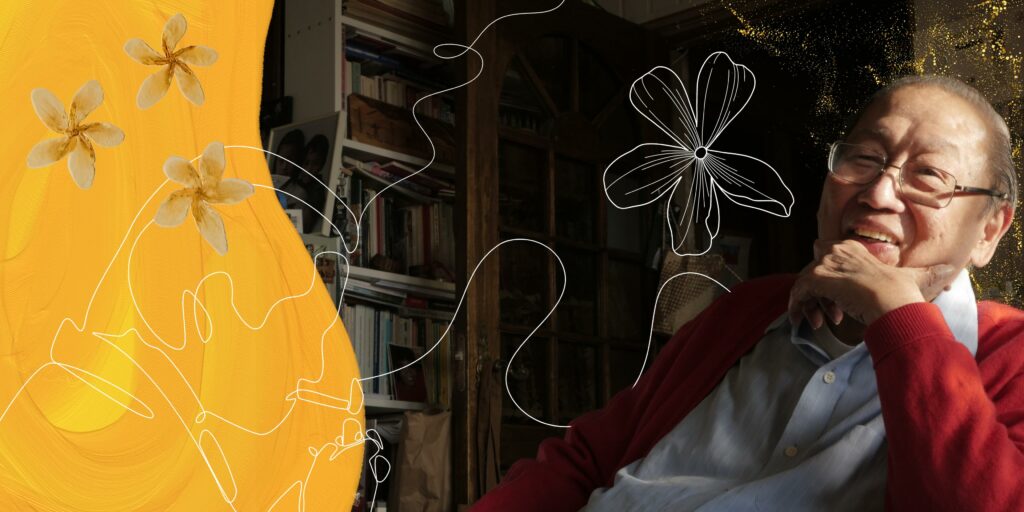Nepantla accomplishes the noteworthy goal of portraying a plurality of lives who’ve been here and who will continue to question why queer living matters right now.

July 29, 2019
One cloudy night last August, a group of queer writers followed the poet and performer Ryka Aoki across a street into a park in Los Angeles. We were looking for a moon that was nowhere to be found. Far from discouraged, we were excited. Beyond the moon we had much to be preoccupied by. There was the wide expanse of the sky, the wet grass, the hollow silences of an average Tuesday evening. Ryka said something I’ll never forget: As poets it’s our job to seek out the moon even when everybody says it isn’t there. Craning my neck upwards, I noticed a bright orange traffic cone in the trees: my moon, my poem.
Of my experiences during Lambda Literary’s Retreat for Emerging LGBTQ Writers last summer, this night left an impression. Believing in poetry has always felt reasonable but because living in the presence of poetry is precisely ordinary, I often underestimate my muscle memory for it. That first day, when I found a table of writers of color separate from the rest of the cafeteria, I sat down with them. We knew we’d gathered together for a reason. Somebody said, “There are more of us here than there were last year.” Somebody else said, “Look at us. Look at some of us.”
Nepantla: An Anthology Dedicated to Queer Poets of Color, edited by Christopher Soto, published in a collaboration between Nightboat Books and Lambda Literary, looks at some of us. Nepantla, a Nahuatl word referring to liminal spaces between worlds, sums up this precarity while showcasing over 100 poets spanning 100 years of American poetry.
Soto is upfront about the necessary limitations in both scope and inclusion that come with anthologizing. In a recent essay for The Millions, he writes, “In more recent years, I have began to question [“(Un)natural bridges, (un)safe spaces”] by Anzaldúa, both of our usages of the word “Nepantla,” and also her ideas around mestizaje. This questioning of her work is done with great respect, understanding that even in her own lifetime she framed and then reframed her own ideas. I view Anzaldúa’s work not as flawless or full of absolute truths but more so as a process of continual intellectual exploration, field blazing in an ever changing landscape.”
What this reading avoids is that the questioning of Anzaldua’s work is coming from Afro-Latinx writers and activists who challenge mestizaje’s erasure of African and black identities. “To say a country or place is racially homogenous because everyone’s a ‘mix’ of the same peoples,” Wendy Trevino says, “is to acknowledge existing racial divisions without acknowledging the racial hierarchies from which they stem.”
In the essay “Counting Tokens,” Yanyi aligns this practice of performing political solidarity with the liberal institution’s diversity agenda which tokenizes marginalized voices while simultaneously disregarding people’s material needs. Addressing last year’s cancelled Poetry issue for trans, gender non-conforming, and non-cis poets, he asks, “Why had the VIDA Count, and not one of the many reported murders of trans people that happened that year, been the impetus for the conversation between the two editors?” When the sole metric for the liberal institution’s diversity agenda is either urgency or newsworthiness, the daily lived struggles of queer people of color are diminished. This happens everytime institutions wield the term “queer people of color” to appeal to new consumers and markets before first improving the needs that existing queer people of color in these spaces seek.
The poems of Nepantla name those needs. Alternately hopeful and bluntly mortal, queer survival models a range of ways to create intimacy in a flawed world. For example, Essex Hemphill’s “American Wedding” mixes desire and violence to reach a sardonically hopeful future. The opening lines “In america / I place my ring / on your cock / where it belongs” hook you into the patriotic expectations of sexual masculine mayhem, then refuse “horsemen” and “soldiers of doom” in order to insist “we need each other / critically.” Both made from, and in spite of, American violence, Hemphill espouses the possibility that comes with inhabiting the tenderness of queer utopia: “They don’t know / we are becoming powerful. / Every time we kiss / we confirm the new world coming.”
What do we want from the new world? A name for this world might be joy: a space that all at once encompasses shouts and growls, schemes and kisses, feels pain and wants for lucidity. When Tommy Pico writes, in an excerpt from “Food,” “Every feed owes itself to death. Poetry is feed / to the horses / within me,” I’m confronting the idea that surviving is both joyful and limited. I don’t consume poetry for sustenance or shelter, though I sometimes do; I rely on poetry to meditate on the conditions for my eventual death. In Richard Blanco’s poem “Killing Mark,” the speaker takes on the paranoia of a lover’s death by conflating it with his own. The lines “Where the hell were you? Couldn’t call? / Translation: I die each time I kill you” teases at hyperbole while also cultivating the knowledge that loving one another as queers means we have only the support systems of our making.
Indeed, many poems are contingent on realities we may not be able to escape: family trauma, mental health struggles, police brutality, homelessness, body/gender dysmorphia. Candace Williams’s “Black Sonnet” punctuates each line with “and I’m still black.” The refrain highlights the margins that separate the spectacle of Black sociality from Black death. The conflation infuses the everyday with the violent; living and dying are two faces of the same coin. But the poem offers its own retreat. Its final lines: “We kick it for a bit and I’m still black. / I turn off all the lights and I’m still black” understands the nonchalance of violence as intimately as gazing at a lover’s eyes. Like someone tallying up their spoons. Like someone checking their weekly budget. In his poem “suicide note #1,” Luther Hughes strikes a starker, more resigned tone, “My father watches / me through the bartender’s / muted eyes, says stay safe. i can’t. i’m black.” Williams and Hughes are counterparts, comrades. Rather than hew to individual cynicism, their voices speak to the ways white supremacy punishes and criminalizes Blackness for existing. Many poems throughout the anthology understand that visibly living as a queer person of color is dangerous. We know what’s at risk. We know when to opt for happiness over safety. We know how to transform these realities into art.
That Nepantla is preoccupied with dying matters because of what comes next. For many poets, more than an end, death acts as a multifaceted space. What does it mean to confront death as a way forward, or at least as a channel for imagining alternative possibilities of living? In many of my friend groups, jokes about death are as common as dad jokes. At the same time, for many loved ones I know death is just around the corner. We’ve been ready to die. We’ve been joking for it in preparation, though we are nevertheless crowdfunding our collective access to food, medical care, and housing.
Each night of the Lambda retreat featured readings by the fellows. Mulling over what I wanted to share, how I wanted my work to be perceived, I talked to the other poets about how to perform trauma in a mostly white room. I refuse to compromise the reality of my experiences in order to appease white feelings. I will be neither agreeable nor easygoing.
In an excerpt from “A Song of Someplace Yet to Fall,” Ryka Aoki writes,
But I am not cruelty-free. I do not offer a gluten-free option.
I won’t talk like a pirate. I won’t pump up the volume, get wasted,
have sex with you at Burning Man. I won’t dig your
hip-hop, save the planet at this badass rally, talk Chinese,
support your Greenpeace, stop eating sushi forsake animal
proteins watch Glee ride a
fixieddonatetoIndiegogoleggoyourEggo.
Shared laughter is an intimate practice. Unabashedly honest, Aoki’s sense of humor runs at an accelerated pace, challenging you to keep up even as it actively insists I will not. Its absurdity forces the collision of language, which drops the spaces between words in favor of frenzy. Refusal is a mode of play that offers new roadmaps of being and expression.
Like Mark Aguhar. I encountered Mark’s work in 2011 on Tumblr. Mark created work that was centered on and for trans femme fat brown girls; she didn’t give a fuck for the white male gaze. She cared about people who mattered. She writes,
BLESSED ARE THE BELOVED WHO I DIDN’T DESCRIBE, I
COULDN’T DESCRIBE, WILL LEARN TO DESCRIBE
AND
RESPECT AND LOVE
In honoring Mark’s legacy, I think about the way Nepantla allows us to consume worlds of poetry within and without proximity. This feels both flawed and real. Mark’s lines offer a voice to hold onto and recognize while withholding their true intention. Maybe that is what I enjoy most about poetry: the ability to change your mind at any point for any reason. On its own, queer and trans writing is neither a salve nor a soothing balm. An anthology cannot be an antidote. While barely cracking the surface, Nepantla accomplishes the noteworthy goal of portraying a plurality of lives who’ve been here and who will continue to question why queer living matters right now.
On the night of the moon viewing, upon reaching the park, we dispersed to gather and contemplate our thoughts. Traffic cone in hand I walked the perimeter of a baseball field then a skateboard ramp. Like many writers, I’d come to the retreat because I had never known what it was like to be part of a queer writing community. Looking into the distance, I saw fifteen of us inhabiting a site-specific orbit of thinking, writing, and being which revolved around our investment in each other’s contentedness. As we regrouped to share our individual reflections we collectively entered a new emotional feeling, tender and vivacious.



